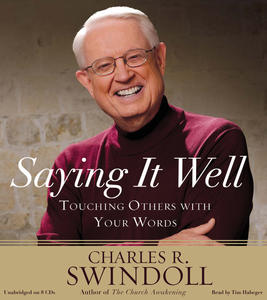Just as
physicians and other ancillary medical staff members are required to have
continuing education units, I believe that preachers should fall under that
same mandate. Many times preachers who
have been in one place for a long time can get stale in their preaching and
praying and it will affect the church they are serving. I am certain that Saying It Well is a book that
will have a measure of inspiration for those who fall into this category. Furthermore, this book is one of those
continuing education books for those who preach.
Author: Charles R. Swindoll
Title: Saying It Well: Touching Others with Your Words
Publisher: Faith
Words, 2012.
The one thing
that sets Chuck Swindoll’s books apart from most others is his ability to be
refreshingly inspirational. He will
never be accused of being a necessarily deep writer but he does have the unique
ability to make you think about the matters of the heart. All of the chapters are just single words and
most of them are verbs. For instance,
Preparing, Going, Digging, Building, Applying, among others.
In his
chapter on Calling, he emphasizes the great importance of being able to point
to a sort of Damascus road encounter that all men need to be able to point
to. Despite what some would say about
his matter, it is clear that every man who determines to preach needs to be
able to give a specific time and place when he felt that strong, demanding call
to preach. Without that sense of
purpose, many fall by the way long into their work and end up making shipwreck
of their own soul and those to whom they were leading.
In the
chapter on Going, Swindoll gives some helpful advice about listening to the
leading voice of God. Often God uses the
circumstances around us to help us to grow and go where we need to. These are the revealing signs of God’s
leading:
·
Unexplained
restlessness despite good circumstances.
·
An
opportunity to exercise trust in God in following a certain course of action.
·
The
encouragement of wise, impartial friends to accept a challenge.
·
A
realization that you current role or circumstance doesn’t fit you and it never
will.
·
Internal
turmoil over your present course.
·
Lack
of excitement and enthusiasm over remaining where you are.
In the chapter
on Digging, which was probably the one that I enjoyed the most is loaded with
practical advice about how to study and how to dig. Every sermon worth anything has to be dug out
of the Scriptures and from a place of prayer.
If you will dig in your study, be prepared to work! It is hard work to put together messages that
are biblically rich and food for the soul.
It requires a man to get in his chair and not to get up until the hard
work is finished. Sermon preparation
that is nothing more than a collection of data will be nothing more than a talk
that is filled with moral platitudes. It
is junk-food for the soul that will cater to “atta-boy!” sermons. “Atta-boy!” sermons are those that are always
providing vague elements of comfort and saying “atta-boy, you can make it!” or
some variation thereof. Loaded with
empty calories that makes for flabby, muffin-top saints who never quite
understand how to handle the perplexities of spiritual challenges and
battles.
In the
section from this chapter called “Advice from the Pastor’s Study,” Swindoll
gives the following suggestions that come in the form of leading questions:
·
What
information/insights can I share that the majority of my audience doesn’t
already have?
·
How do
I want my audience to think differently and then respond after the preaching?
In this
chapter on Digging, he also maps out his personal schedule of preparation that
he has followed for decades in preparing to preach. Since I enjoy hearing about how other
preachers put things together (See links on Jeff Arnold, Ben Weeks, Jason Calhoun, J. H. Osborne, John Carroll, Scott Graham, Doug White) I also enjoyed the schedule he laid
out.
He also has a
whale of a chapter on Illustrating which you will find helpful. Swindoll helps you to look at areas in the
common areas of life that will provide excellent sources to season your
preaching with.
·
Nothing
can compensate for a lack of authenticity.
· I still go through the same digging process when I use an old sermon, but now I’m digging through soft soil.
· One gains authority to say it well by preparing well.
· This journey is a continual pursuit of your calling and a perpetual extension of your preparation.
· I still go through the same digging process when I use an old sermon, but now I’m digging through soft soil.
· One gains authority to say it well by preparing well.
· This journey is a continual pursuit of your calling and a perpetual extension of your preparation.
·
It
is important to know who you are not.
·
John
Henry Jowett is quoted, “Preaching that costs nothing accomplishes
nothing. If the study is a lounge, the
pulpit will be an impertinence.”
·
An
impactful sermon requires a solid foundation of truth, or it will crumble under
its own weight.
I would
recommend that you add this book to your list to read in 2013.
Thanks for
reading. . .






No comments:
Post a Comment